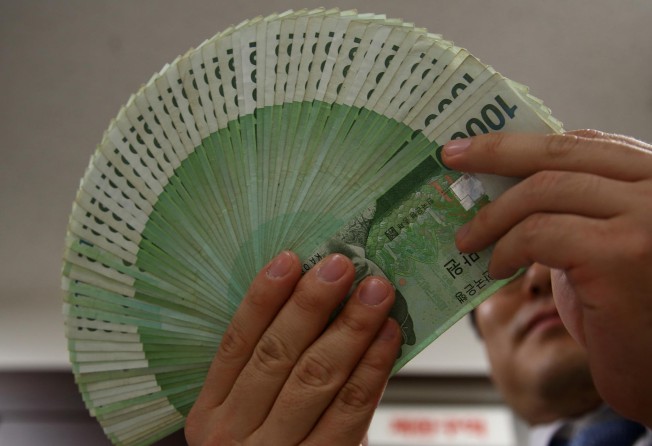Goldman Sachs warns won-yuan trading will weaken South Korean currency
US bank predicts that direct trading between won and yuan could slow inflow of US dollars

A plan to start direct trading between the won and mainland China's yuan will hurt the South Korean currency by slowing the inflow of dollars, Goldman Sachs Group said in a report.
Governments of the two Asian countries agreed on July 3 to make their currencies mutually exchangeable in Seoul later this year. The plan supports Goldman's prediction that the won will drop to 1,050 per dollar by the end of 2014, from 1,025.65 yesterday, Kwon Goohoon, a Seoul-based economist at the US bank, wrote in a report.
"This market will likely increase yuan settlement for Korean exports to China and expand yuan investments by Korean investors, weakening the won against the dollar in the process," Kwon wrote.
South Korea's trade surplus with mainland China, its biggest export partner, amounted to US$24 billion in the first six months of this year, according to a July 1 government report. With only 0.3 per cent of trade payments settled in the mainland Chinese currency, the won-yuan market has the potential to grow rapidly, the Goldman report said.
The value of South Korea's yuan transactions with mainland China and Hong Kong has jumped by 5.6 times since June 2013, the Society for Worldwide Interbank Financial Telecommunications, or Swift, said. Bank of Korea data show yuan deposits in the country surged 80 per cent this year as investors sought higher interest rates.
Mainland China's currency ranked seventh for global payments in June, according to Swift. The won has appreciated 2.3 per cent against the dollar this year and advanced 4.3 versus the yuan in the same period, data showed.
The won, which can only trade onshore in South Korea at present, may also be transacted in mainland China in the future. The two countries will seek to establish infrastructure enabling direct trading in Shanghai.
The agreement also awarded South Korea an 80 billion yuan (HK$100.5 billion) quota for domestic investors to buy securities in mainland China under the renminbi qualified foreign institutional investor programme.
South Korea residents held US$40.67 billion in dollar-denominated deposits at the end of June, while those in yuan were equivalent to US$11.97 billion, central bank figures show. Kwon estimates yuan savings in the country can rise 2.5 times during the next 18 months.